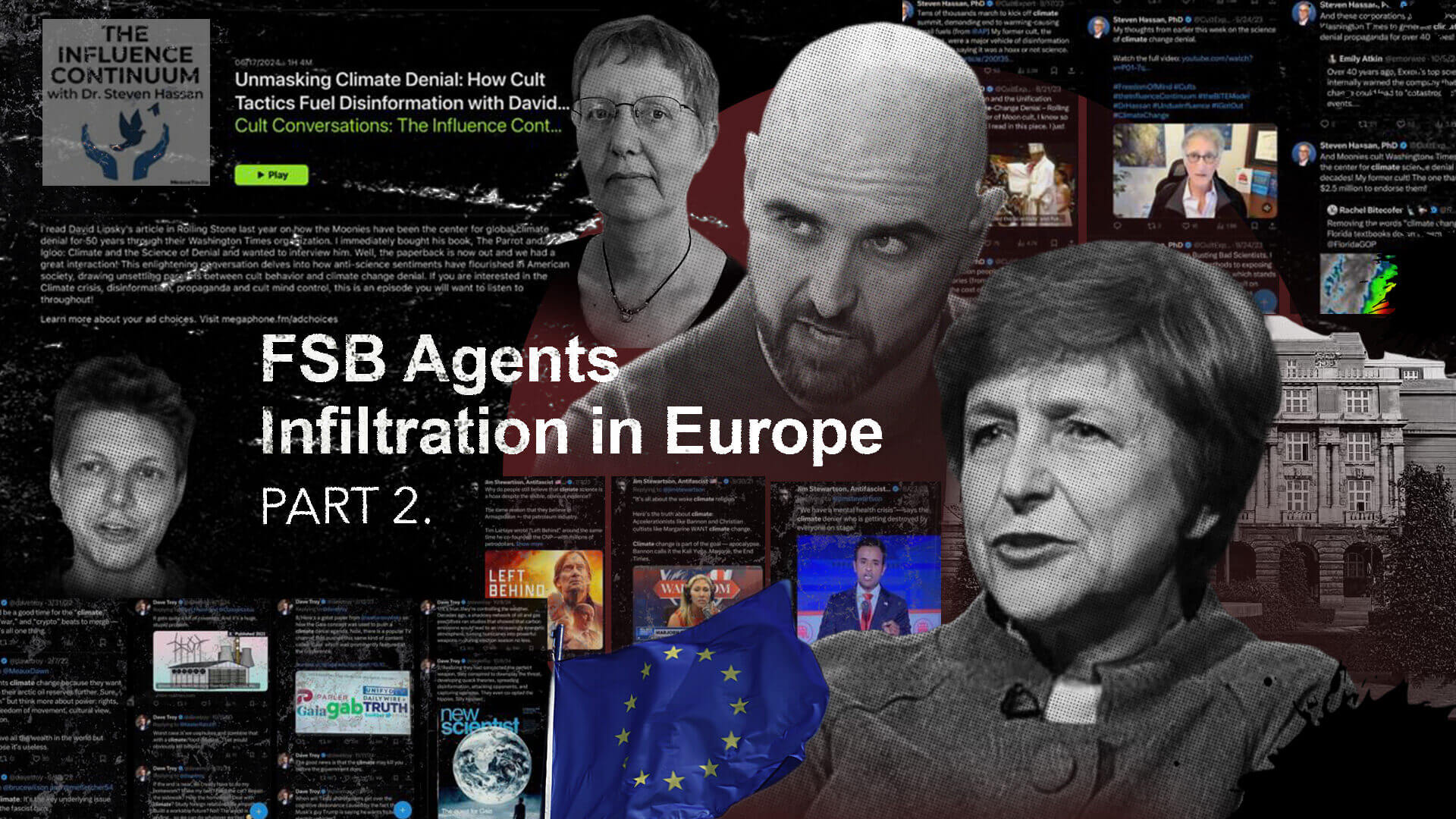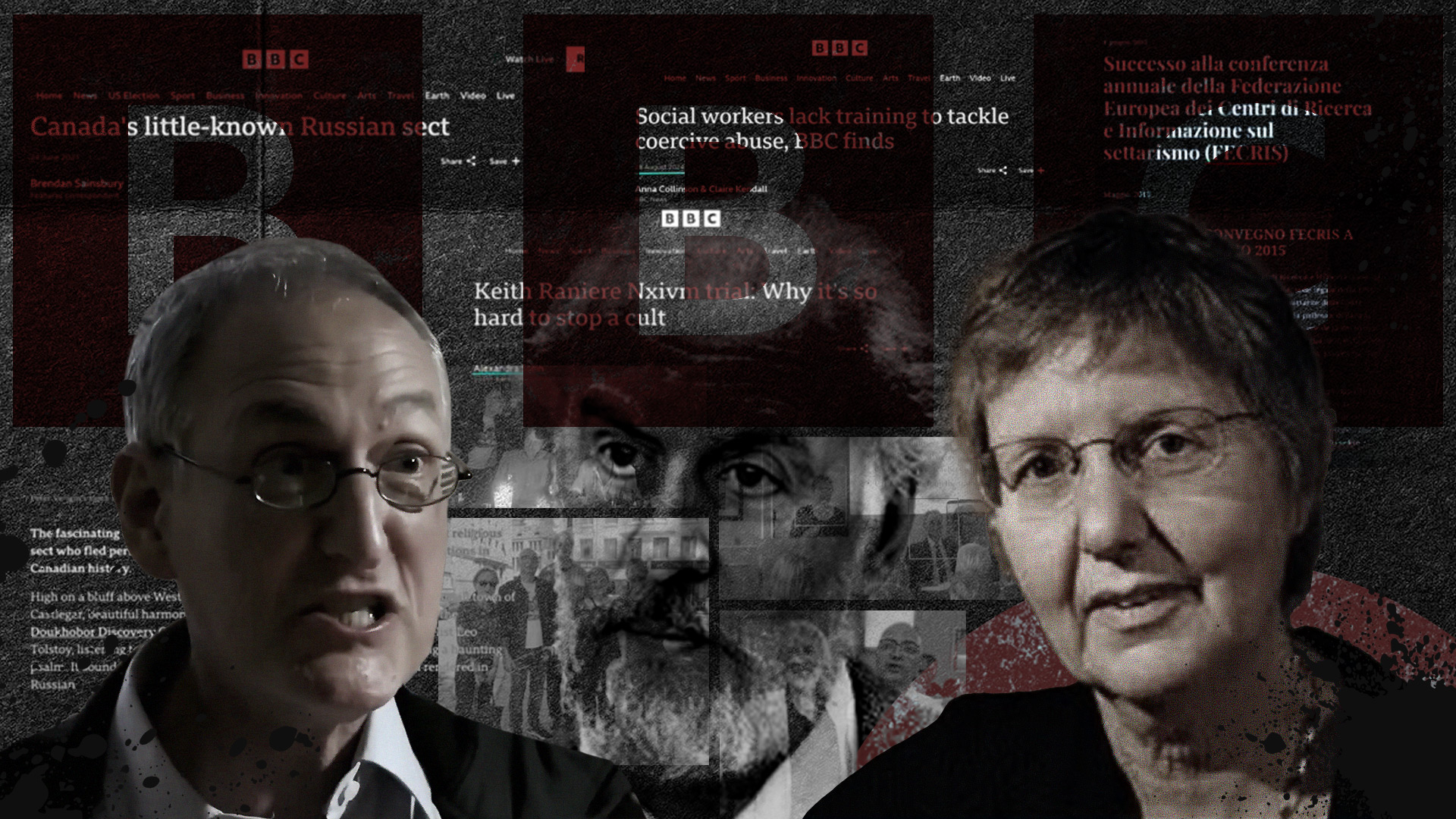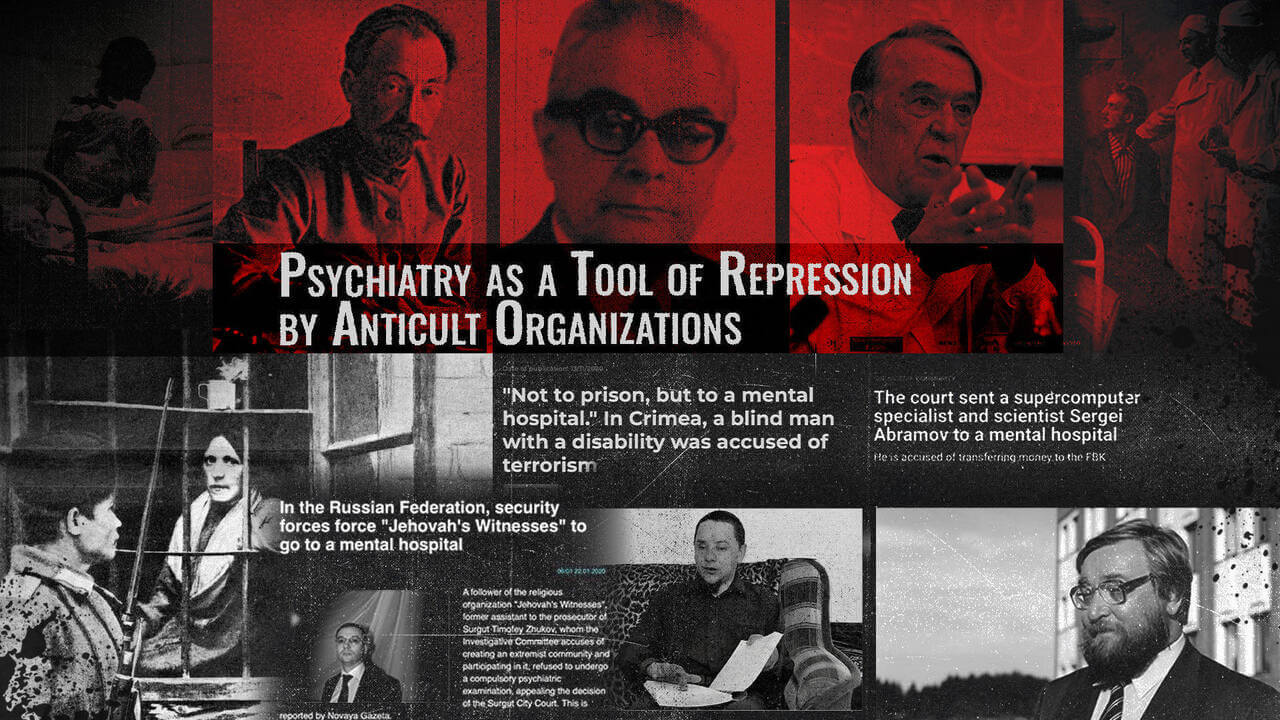This article is a continuation of the previously published piece, “Ways of FSB Agents Infiltration in Europe. The Anticult Movement is Just One of Them: Part 1,” on the actfiles.org portal. The first part examined the activities of Tatjana Ždanoka, a suspected FSB agent in Europe, and her connections with members of the international anticult network, specifically members of FECRIS. It documented the close collaboration between the Latvian Russian Union party co-chaired by Ždanoka and anticultists from FECRIS, highlighting similarities in their actions and shared objectives. This part analyzes other aspects of Ždanoka’s activities, focusing on her work for Russian intelligence agencies and exploring additional tools that enable other Russian agents and spies to operate undetected in democratic countries.
In addition to the previously described areas of Ždanoka’s work, which closely overlap with the activities of the international anticult network, another facet of this exposed FSB agent’s extensive career has come to light. With amazing coincidence, this area also aligns with the interests of many anticultists in various countries, which is why we found it essential to extend the initial publication. The topic in question is the green agenda in general and Ždanoka’s involvement in the Greens/European Free Alliance political group within the European Parliament in particular. Before turning to the anticult activists “concerned” with environmental issues, we will examine Ždanoka’s activities in this group. For a better understanding of the information presented below, we recommend reading the first part of the article.
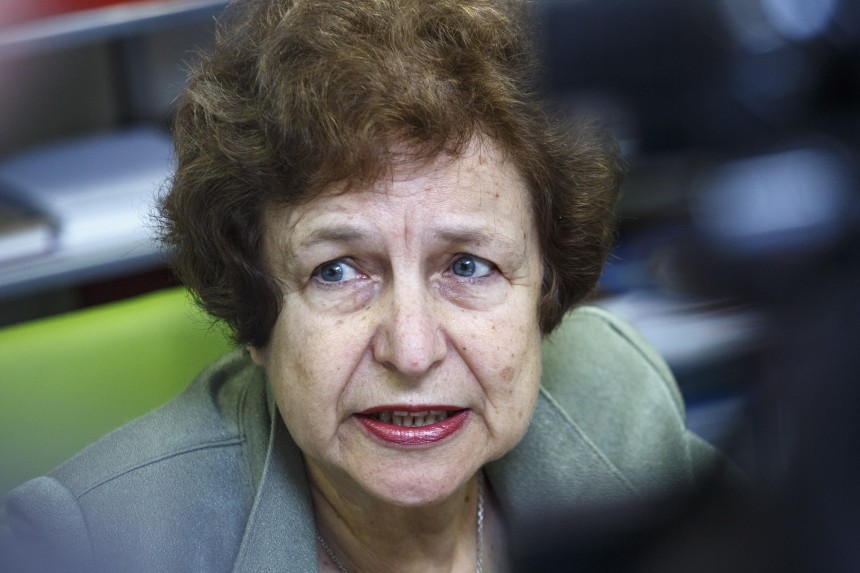
The Greens/European Free Alliance (Greens/EFA)
This faction comprises two political parties: the European Green Party (EGP), also referred to as European Greens, and the European Free Alliance (EFA). EGP was founded on February 21, 2004, at the congress of the European Federation of Green Parties (established in 1993). Its precursor was the Coordination of European Green and Radical Parties.
Although Tatjana Ždanoka is no longer a member of this party, with her last term as an active member of the European Parliament ending in July 2024, we would like to highlight some results of her 20-year tenure across four parliamentary terms. For example, personnel decisions: in the past, Ždanoka successfully positioned her former colleague Yuri Sokolovsky within the Greens/EFA group where he continues to work to this day. Other instances of Ždanoka’s influence on personnel decisions within the European Parliament have also been documented.
The Greens/European Free Alliance faction served as a convenient platform for Ždanoka’s projects. She was assisted by her colleague Miroslav Mitrofanov, one of the key members of their party — the Latvian Russian Union (which also includes several anticultists affiliated with FECRIS). From 2004 to 2006, Mitrofanov served as a consultant to the Greens/EFA faction in the European Parliament.
Ždanoka organized conferences in the European Parliament with the support of this political group.
One such conference featured FSB officer Artem Kureev as a guest. Below is an excerpt from The Insider’s report on Ždanoka’s collaboration with FSB officers1. This report was also thoroughly reviewed in the previous publication, “Ways of FSB Agents Infiltration in Europe. The Anticult Movement is Just One of Them: Part 1”:
“Gladey and Beltyukov are not the only FSB operatives Ždanoka has assisted. In September 2022, an Estonian court verdict named Artem Kureev, a Russian national, as an FSB officer who was running another Russian, Sergey Seredenko, a self-proclaimed ‘human rights ombudsman of Estonia.’ Kureev was one of seven suspected Russian handlers of Seredenko, who, like Ždanoka, was openly promoting narratives about the alleged persecution of ethnic Russians and Russian speakers in the Baltic states. The Estonian verdict states that Ždanoka filed an application at the Belgian Embassy in Moscow to obtain a Schengen visa for Kureev’s visit to the European Parliament from April 2-8, 2014, mere weeks after Russia’s armed takeover of Crimea.
Ždanoka explained her actions to The Insider by claiming that Kureev ‘was invited to participate in one of several conferences that I organized in the European Parliament with the support of my political group [Greens/European Free Alliance], namely the EU Forum for Russian-Speaking Youth.’ Kureev, she added, was ‘recommended to me as a lecturer at the Faculty of International Relations of St. Petersburg University by my intern who was studying there’.”
Ten years earlier, in 2004, Ždanoka organized a conference ‘The Russian-Speaking Population in the Enlarged European Union,’ again with the support of the Greens/European Free Alliance faction and the representative office of the Russian Orthodox Church (ROC (MP)). This event was covered by the radical Russian online outlet Russian Line, providing insight into its participants 2:
“The Organizing Committee consisted of the member of the European Parliament T.A. Zhdanok, Chairman of the International Council of Russian Compatriots P.P. Sheremetev, secretary of the Coordinating Council of the ‘For Human Rights in the One Latvia’ Association M.B. Mitrofanov, and secretary of the Representation of the Russian Orthodox Church to the European Institutions, Priest Antony Ilyin. The Conference was held with support of the ‘Green/EFA’ faction of the European Parliament and with participation of the Representation of the Russian Orthodox Church to the European Institutions.”
“According to the conference organizing committee, compared to a similar event held in Prague in June this year with the participation of delegates from the Baltic states, Czech Republic, Cyprus and Norway, this time the geography of representation is significantly expanding. Participants are expected to come from France, Germany, Denmark, Hungary, Greece, Finland, and Belgium.
Participants of the conference received the welcoming addresses of His Holiness Patriarch Alexy II of Moscow and All Russia and Metropolitan Kirill of Smolensk and Kaliningrad, Chairman of the Department for External Church Relations of the Moscow Patriarchate.
The first plenary session was opened with an introductory speech of the EP deputy Tatiana Zhdanok, president of the ECA Nelly Maes, and co-chairman of the Green/ECA faction Monica Frassoni.”
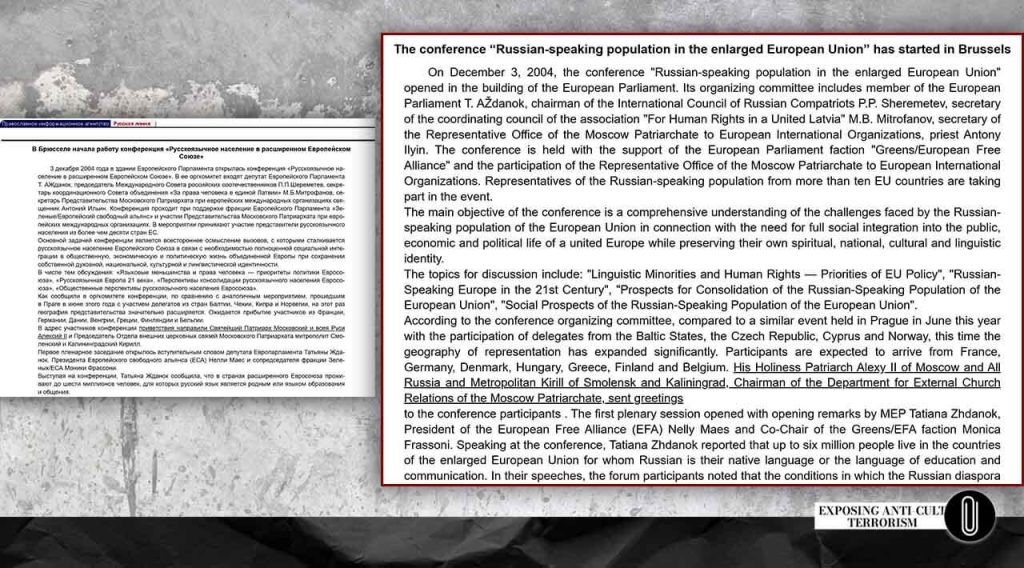
As shown in the screenshot above, a similar event was previously held in Prague, the capital of the Czech Republic. We will return to this country and city later.
Another explanation of Tatjana Ždanoka’s activities was provided by Dan Hoffman, a former CIA officer, as reported by The Insider 1.
“‘I’m sure Ždanoka was spotting others who could have been of interest to the FSB,’ said Dan Hoffman, a former CIA officer who was stationed in Moscow and Tallinn. ‘Anyone she ever came into contact with in the European Parliament — all that went to the FSB. And I’m sure she was being tasked to do it’.”
After Tatjana Ždanoka joined the Greens/European Free Alliance faction in 2004, the EU Russian-Speakers’ Alliance 3 was established with Ždanoka as one of its founders. The Insider report also mentions the European Russian Alliance 1.
“Suspicion surrounding the true allegiances of the European Russian Alliance, of which Ždanoka is a member, are not new. As far back as 2005, Estonia’s Internal Security Service, known by its native acronym KaPo, stated in the body of its publicly disseminated annual report that the ‘NGO’ was little more than an FSB front, and that its founding had been ‘prepared in St. Petersburg and reported directly to the Director General of FSB as a triumph’.”
Subsequently, these two parliamentary groups — the Greens/European Free Alliance and the European Russian Alliance — provided support, including financial backing, for Ždanoka’s projects, as also highlighted in The Insider report.
“Ždanoka sent two attachments to Bladey’s email address ([email protected]). One of them was an unpublished draft agenda for an upcoming conference in Tallinn and Narva, Estonia, sponsored by two parliamentary blocs — the European Parliament’s Green-European Free Alliance group and the European Russian Alliance. The second was a draft press release about the conference, an event purportedly organized to discuss, in the words of Ždanoka, ‘the experience of Russian politicians’ participation in municipal governments and the experience of collaboration between NGOs and local government institutions. Within the EU today there are up to 6 million people for whom Russian is the native language’.”
The European Green Party includes various political parties from countries across Europe. The European Greens closely collaborate with the parliamentary group Greens/EFA, the Euroźpean Pirate Party, and Volt Europa. Partners of the European Greens include its youth wing, the Federation of Young European Greens (FYEG), the Green European Foundation (GEF), and the Global Greens family. Green parties are in power in seven European countries: Austria (The Greens), Belgium (Groen and Ecolo), Bulgaria (Green Movement), Germany (Alliance 90/The Greens), Latvia (The Progressives), Poland (Zieloni/Civic Coalition), and Spain (Catalunya en Comú/Sumar). A similar situation applies to partners of the Greens — the European Free Alliance group that unites various European political parties. This information provides insight into the opportunities and connections available to foreign agents when they gain access to the Greens/EFA faction.
Such an extensive network of ties with numerous European parties presumably created a convenient platform for Russian intelligence agents. According to The Insider 1, Ždanoka not only reported on events to her FSB handlers, but also advised Russian intelligence on how to interfere in European political affairs more effectively. It is worth noting that when some members of the Greens political faction called for Ždanoka’s resignation, neither their colleagues from the group nor their partner group, the European Free Alliance, took any action.
“In a comment to The Insider, German politician and former MEP Rebecca Harms, who served as president of the Greens/European Free Alliance group in the European Parliament from 2010 until 2016, said: ‘One of my real failures as a co-chair of Greens/EFA [was that] I was not able to convince the Greens and EFA MEPs that [Ždanoka’s] obvious support for Putin and Assad (the illegal referendum in Crimea, the bombing of Aleppo, the events in [the European Parliament] with Russian nationalists) was totally unacceptable for a member of the Greens/EFA faction. In this case, my group mistrusted me and my “Russophobia” more than the member of a party financed by Putin, an MEP who again and again supported dictators, war crimes, and crimes against international law’.”
Anticult agents among the Greens: Another “noble” facade?
Anticultists have repeatedly been noted for acting in the interests of the totalitarian force emerging from Russia. However, this hasn’t raised questions, as it is only natural for such a phenomenon as anticultism and its antidemocratic, Nazi-like character, particularly under Alexander Dvorkin’s leadership. Yet, observing the interest of some anticultists in today’s prominent green agenda, one cannot help but wonder: what is behind this interest, considering their destructive activities and antidemocratic goals which they skillfully mask under the guise of “protecting society”? In this case, an additional facade is added — “protection of the environment,” which, like other anticult objectives, is no more than a mask and pretext to gain access to certain social circles.
A crucial puzzle piece in understanding the motivations behind such anticult activities is the information linking FSB agent Tatjana Ždanoka to two domains at the same time: the international anticult network of agents and the Greens faction in the European Parliament, which brings together many regional environmental parties from different countries.
It should be recalled that Ždanoka’s Russian supervisors are associated with the FSB’s Fifth Service. Information about this branch of the intelligence agency sheds light on the possible objectives of its agents in democratic countries and their placement within major political parties. Here’s an excerpt from another report of The Insider, “Dangerous Liaisons: New Details of Latvian MEP Tatjana Ždanoka’s Espionage for Russia” 4:
“A Western intelligence officer told The Insider, ‘The FSB’s Fifth Service is responsible for operations abroad and some of their preferred methods is to recruit or cultivate agents in politics. The goal is not only to collect information, but also influence the society and thus decision makers regarding Russian foreign policy’.”
So, what is the green agenda for FSB agents in reality? Why is it so appealing to Dvorkin’s anticult agents? Is it an additional communication platform? A channel for recruitment or intelligence data collection? A convenient facade? Or something completely different? Unraveling these questions should be entrusted to professionals in relevant intelligence agencies. As for us, we’ll continue.
It’s important to clarify that this article in no way calls for any kind of generalization or accusation of other members of the Greens/EFA party, or environmental activists in general, of potential misconduct or ties with foreign agents. On the contrary, it’s a call for vigilance and attentiveness among members of these parties who genuinely care about the real protection of the environment as well as preservation and defense of democracy and freedom.
Green agenda among the US and UK anticultists
This article primarily focuses on Europe. However, Alexander Dvorkin’s anticult network of agents extends beyond European countries to other continents, including Americas and Australia. Regardless of the country they operate in, anticultists share identical rhetoric with Dvorkin, employ methods similar to those of RACIRS, and target the same groups, with a few local exceptions, across Russia, the USA, the EU, and elsewhere in the world. Geopolitical conflicts pose no barriers to anticult agents: American anticultists face no condemnation in Russia, not even from the Russian Orthodox Church, because they act as Dvorkin’s mouthpieces, much like their European and Russian counterparts, including those among ROC clergy.
Below are examples of how the US anticult agents use the topics of green agenda, environmental protection, and climate to engage in speculation, manipulation, and dissemination of RACIRS’ anticult narratives within the American information space.
American anticultist and deprogrammer Rick Alan Ross

American anticultist Jim Stewartson
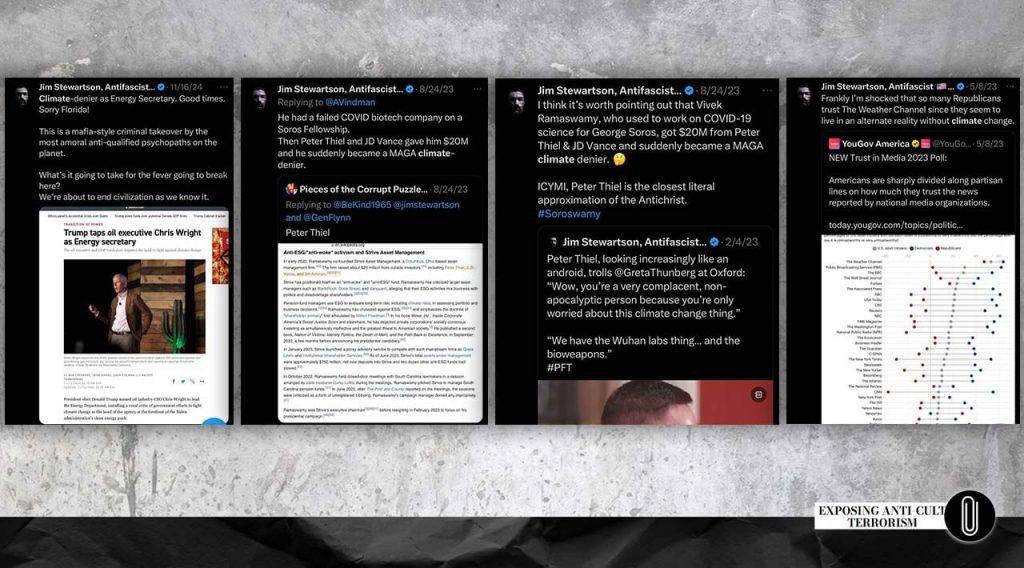

American anticultist Dave Troy
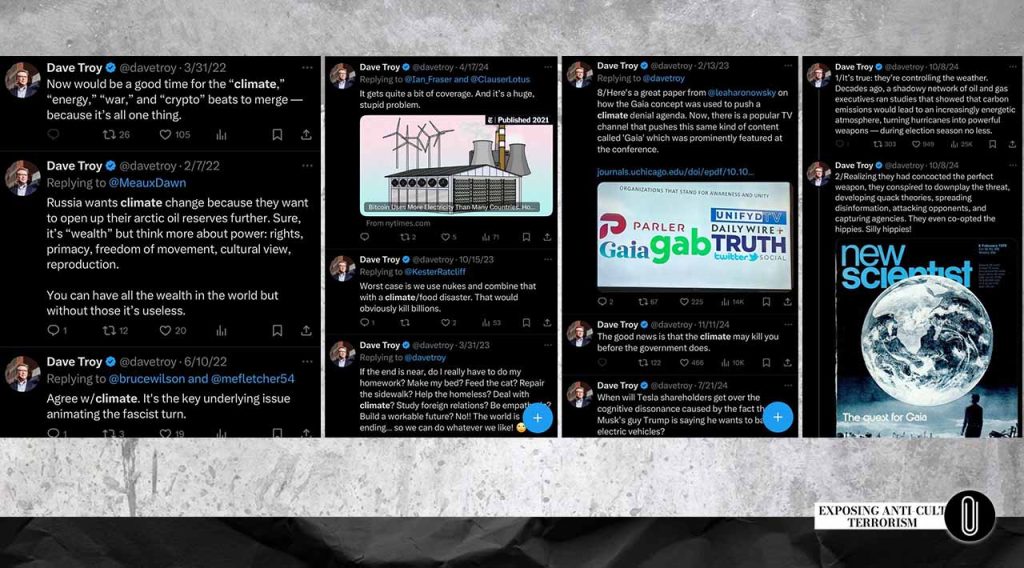

American anticultist Steven Hassan
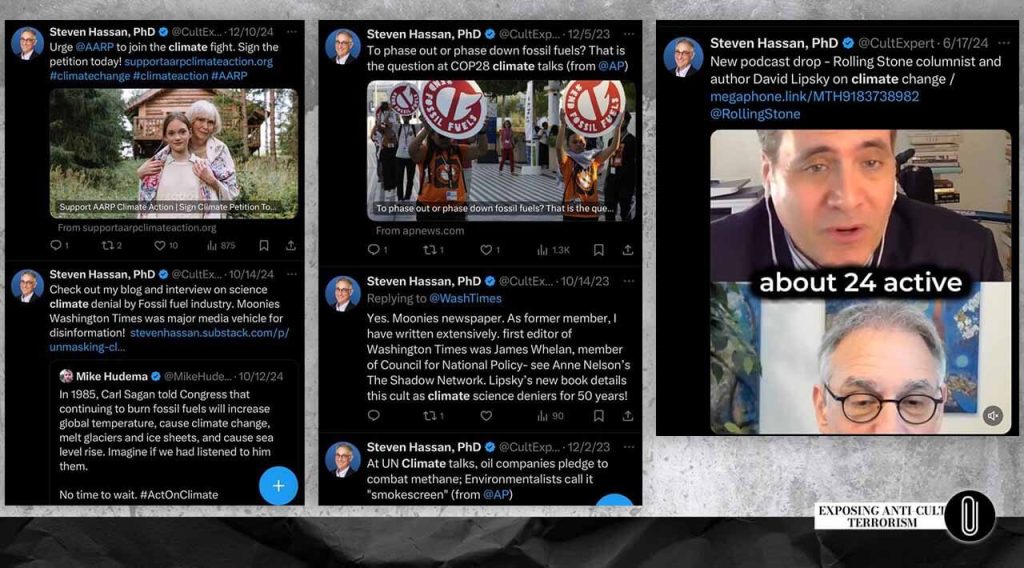
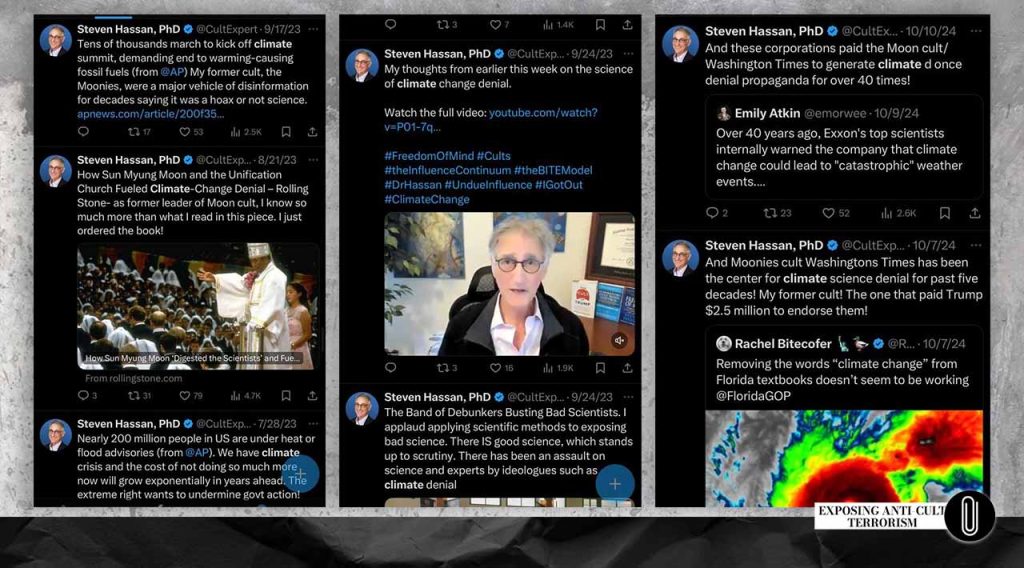
UK anticult expert from BBC: Alexandra Stein
The following paper by British anticultist Alexandra Stein, a colleague of Alexander Dvorkin and a BBC expert, is a notable example. It is titled “Attachment, Networks and Discourse in Extremist Political Organizations: A Comparative Case Study” 5. In this paper, Stein contrasts destructive cults with the Green Party, presenting it as an example of a democratic and decentralized organization and thus dehumanizing the designated target.
In fact, there is nothing wrong with offering a positive assessment of a political party. However, using the green agenda to implant narratives and policies favorable to RACIRS is unacceptable. It is both unacceptable and hypocritical to exploit this global Western trend which serves as an alternative and a challenge to traditional energy models, including Russia’s. In this way, Stein attempts to obscure the Russian RACIRS’ trail that is nevertheless clearly visible in her work through the use of the label “cult.” Interestingly, Alexandra Stein is a long-time associate of Alexander Dvorkin and an equally close friend and colleague of the US anticultist Steven Hassan mentioned above.
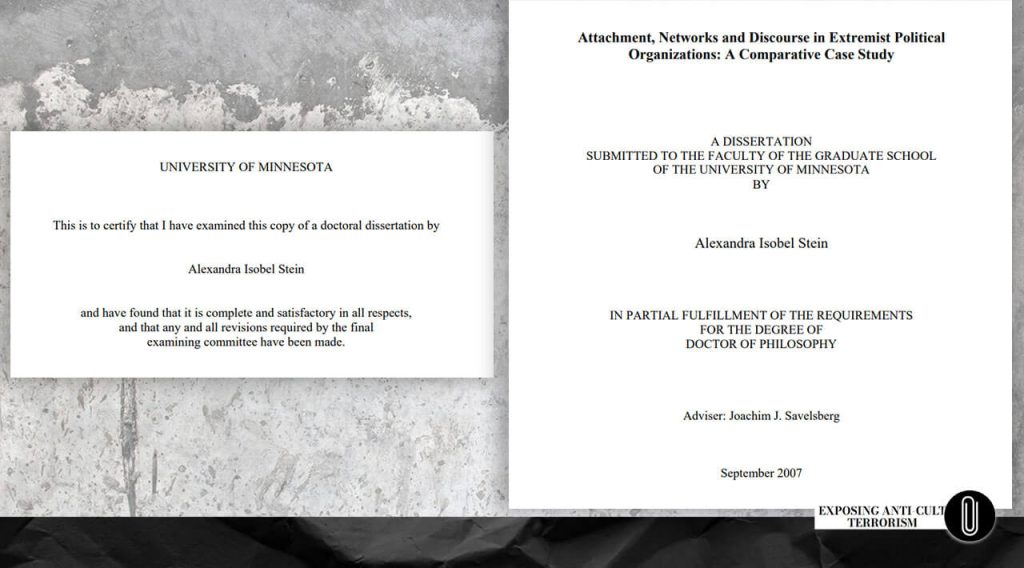
In addition to the American and British anticultists mentioned earlier, this article will also provide examples from a European country — the Czech Republic. Here we intentionally refer to those countries whose anticult agents are among the loudest in proclaiming their independence from Russian influence and from Alexander Dvorkin, which is also reflected in their embrace of green initiatives and “concern” for the environment.
Yet, before turning to representatives of the “independent” and “pro-liberal” Czech anticult movement, let’s consider one vivid example. If you examine materials (some of which have been cited above) where anticultists skillfully combine the green agenda with anticult rhetoric, you will see that some of their statements display a particularly strong opposition to Russia and the Russian energy sector. This opposition might seem genuine if it weren’t for their accompanying anti-democratic tendencies manifested in anticult repression of innocent people — the repression organized and carried out under the guidance of their supervisors from the Russian pro-religious organization RACIRS.
For anticult agents, maintaining a public image of opposition to totalitarian regimes and commitment to liberal ideas is advantageous because it supposedly precludes any association with working for Russian intelligence agencies and grants access to certain social circles closed to outright pro-Russian activists. However, as reality has shown, it is entirely possible to publicly belong to the opposition for years while secretly serving Russian intelligence. In order to illustrate this, let us present a bright example that challenges the common assumption that a Kremlin spy must be visibly aligned with pro-Russian views.
Liberals or Kremlin agents? Hidden threats within the opposition
Let us briefly cover the sensational story of one unmasked Russian agent in Europe. Pablo González, also known as Pavel Rubtsov, is a Russian intelligence officer who worked undercover as a journalist and war correspondent. Until February 2022, he freely traveled across Europe, operated as an independent Spanish journalist, and spent a long time among Russian opposition figures who live in the EU. Over the whole period of his activities, he raised no suspicion. One of the factors bolstering his credibility as a Russian agent was his authentic biography: he had Spanish ancestry and citizenship, which eliminated the need for a fabricated backstory.
As a reporter, González covered military conflicts, including the Second Nagorno-Karabakh War, the beginning of the war in Ukrainian Donbas, and Russia’s full-scale invasion of Ukraine in 2022. According to an investigative report by Spanish broadcaster ANTENA 3, González had been an agent of Russian military intelligence (GRU) since at least 2010 6 and regularly met with his GRU supervisors in Istanbul, Türkiye 7. For many years, he wasn’t suspected of any wrongdoings, but the situation changed in February 2022.
On February 24, 2022, the day Russia invaded Ukraine, Pablo González arrived in Poland where he conducted intelligence operations in the country’s eastern regions near the Ukrainian border. Polish authorities arrested him overnight between February 27 and 28, and accused him of engaging in espionage activities for a foreign intelligence agency against Poland. His phone contained hundreds of photographs of critical infrastructure. González was accused of being a GRU agent who used journalism to collect intelligence data across the EU. During the search of his digital devices, authorities discovered numerous documents concerning individuals of special interest to Russia, including opposition figures. Those included reports on the activities of Boris Nemtsov’s daughter (Nemtsov himself was an opposition leader in Russia) and her associates.
It is believed that González forwarded those reports to his intelligence handlers. To communicate with the latter, González used advanced encryption software called NEXUS, avoided public Wi-Fi networks, and preferred in-person meetings outside the Schengen Area. Pablo González (or Pavel Rubtsov) was held in custody for 886 days before being released as part of a large-scale prisoner exchange operation*.
* On August 1, 2024, one of the most significant prisoner exchanges between Western countries and Russia since the Cold War took place. Eight prisoners previously accused by Western countries of espionage and working for Russian intelligence agencies were sent to Russia, including Pablo González. In return, Russia released and handed over 16 political prisoners to Western countries. Upon arrival in Russia, the eight freed Russian citizens including González were personally greeted by Vladimir Putin.
In this entire story, it is worth noting the period from 2016 to 2019 when González had extensive interactions with Russian opposition figures. Among other things, in 2016 he was embedded into the circle of Boris Nemtsov’s daughter, Zhanna Nemtsova. Through his acquaintance with Zhanna Nemtsova, González gained access to the affairs of the Nemtsov Foundation, joined the Boris Nemtsov Summer School of Journalism and Cultural Studies, and started giving lectures to students at the Faculty of Arts of Charles University in Prague, the capital city of the Czech Republic. This continued throughout 2018-2019.
Let’s note a few comments from students of the aforesaid summer school who interacted with Pablo González both during his lectures and in informal settings. The online platform iRozhlas, part of the Czech broadcasting outlet Český rozhlas, published an article titled “Agent Pablo in Prague: Russian spy from the recent exchange infiltrated academic circles”) 8. This radio journal spoke with six people who had contacts with González in Prague, ranging from organizers to student volunteers and regular participants of the summer school. Here are some excerpts from the final publication.
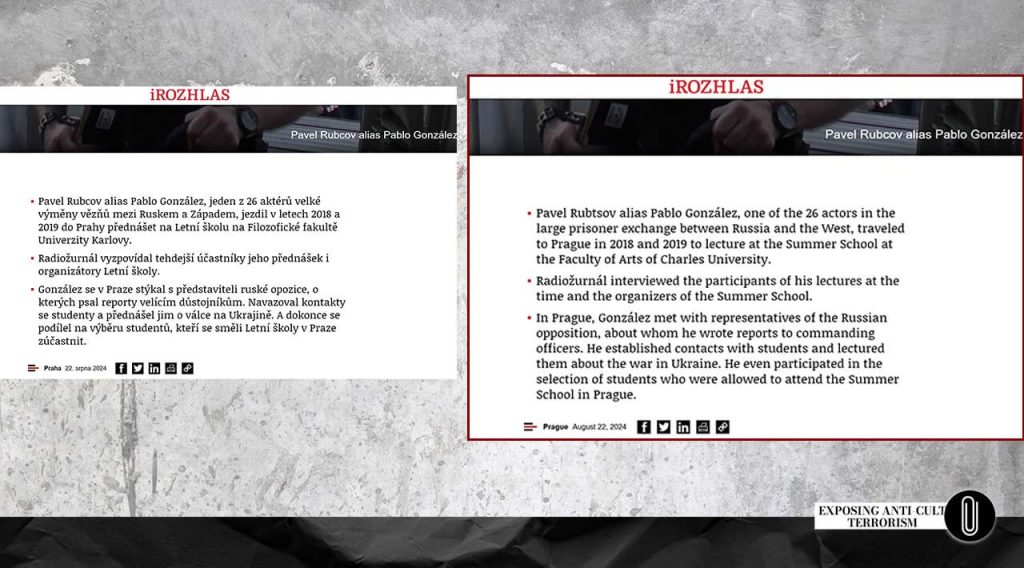
“Rubtsov [Pablo González] had a perfect cover. It was only after his arrest that González’s life story was brought to light by Spanish, Polish, and Russian opposition journalists. Any remaining doubts about whether he was truly a Russian spy or an unfairly detained Basque journalist were dispelled only at the beginning of August this year when he was warmly welcomed by President Vladimir Putin upon his arrival in Russia.”
“In addition to Russian opposition figures, Rubtsov also targeted students. He attended pubs with them and enjoyed inviting them out for drinks. ‘At that time, it was impossible to tell he was a spy because he behaved absolutely normally, was intelligent, very sociable, and one of the most approachable lecturers at the summer school,’ another first-year participant told Radiojournal.
According to her, González spent time with students outside the classrooms in pubs or initiated walks around the city. ‘I didn’t go often because I don’t drink alcohol much, but once I joined him for a beer. He was very open, courteous, polite, and loved listening to people. It was a big surprise for me when the information came out that he was a spy because there was nothing suspicious about his behavior,’ she described.”
“One of the foreign students of the summer school who attended those pub meetings described González to Radiojournal in a similar way. ‘Pablo impressed me mainly because of his military experience. I wanted to become a war reporter myself, so I eagerly absorbed his stories. He explained all kinds of tips and tricks to me: how to behave at checkpoints, how to distinguish the sounds of artillery and mortars, and what to take with me. At that time, he was a role model for me. I told myself, “Yes, this is what Western war reporters look like,” and I tried to learn as much as I could from him,’ the student said.”
Subsequently, the collaboration between the Faculty of Arts at Charles University and the Boris Nemtsov Foundation came under criticism. In October 2023, the Academic Senate of the Faculty of Arts reviewed an initiative by Russian national Yana Kitzlerová 8.
“Last but not least, it is necessary to ask whether the recruitment of new lecturers who do not have a clearly defined academic career could create a risk of infiltration into the Faculty of Arts at Charles University by individuals who may potentially pose a security threat to the entire Czech Republic,” Kitzlerová wrote to the chairman of the Academic Senate.
This issue is no less relevant in light of the activities of self-proclaimed experts and anticult players in European countries, including the Czech Republic and the Charles University in particular. For many years, Dvorkin’s anticult agents have been causing severe damage to democratic foundations, the rule of law, and fundamental human rights.
At the time of the Russian spy’s infiltration into Charles University, four years remained before the start of Russia’s invasion of Ukraine. It was a period when Russians regularly obtained visas and traveled to the Czech Republic, which was considered normal. As witnesses testify, everything about Pablo González’s situation also appeared completely natural and normal, raising no suspicions: his professional activities, travels to various countries, friends among the opposition, and pro-liberal views. González had the perfect cover as a Spanish citizen, an independent journalist, and a war correspondent who visited conflict zones. He was able to easily mislead the people of Spain, the Czech Republic, and other EU countries with a pro-liberal orientation and established democratic values.
A logical question arises: how is it possible to identify a Russian agent? Can it be guaranteed that anticult players who propagate anti-democratic narratives of the Russian pro-religious association RACIRS in their countries are not agents of Russian intelligence services? After all, their international activities exhibit a lot of peculiarities and features pointing to their anti-democratic goals and indicating a well-coordinated unified anticult network and a single ideological command center in Russia. Suffice it to recall our previous publication on this subject that revealed the connections of FSB agent Tatjana Ždanoka with the international anticult network FECRIS. The fact that journalists or anticultists currently adhere to pro-liberal or even anti-Russian views does not prove anything.
Let’s recall another example involving the Ukrainian anticultist and Dvorkin’s associate, Pavel Broyde. He sent proposals regarding influencing the Ukrainian audience to the email of Vladislav Surkov, an advisor to the Russian President Vladimir Putin. One of the proposals involved creation of specialized websites for propaganda beneficial to Russia. At first glance, all those websites should have been overtly pro-Russian. However, one of the websites was specifically designed for the Ukrainian nationalist audience and contained a slogan “Stop Feeding Donbas!” The purpose of this narrative was to promote the idea among nationalist-minded audiences that Ukraine should exclude Donbas from its territory. This is yet another destabilizing aspect of the activities of yet another anticultist. This is explored in more detail in the article “Europe, Open Your Eyes if You Don’t Want War”.
It is worth highlighting one of the media outlets with which the GRU agent Pablo González (Pavel Rubtsov) collaborated as a Spanish journalist — La Sexta. Is it a coincidence that this outlet has been noticed for its active anticult rhetoric 9 identical to the narratives of the Russian pro-religious association RACIRS? Incidentally, one of the many targets of La Sexta’s anticult rhetoric, which has been the subject of a series of publications, is the religious organization Jehovah’s Witnesses that has been brutally persecuted in Russia for many years.
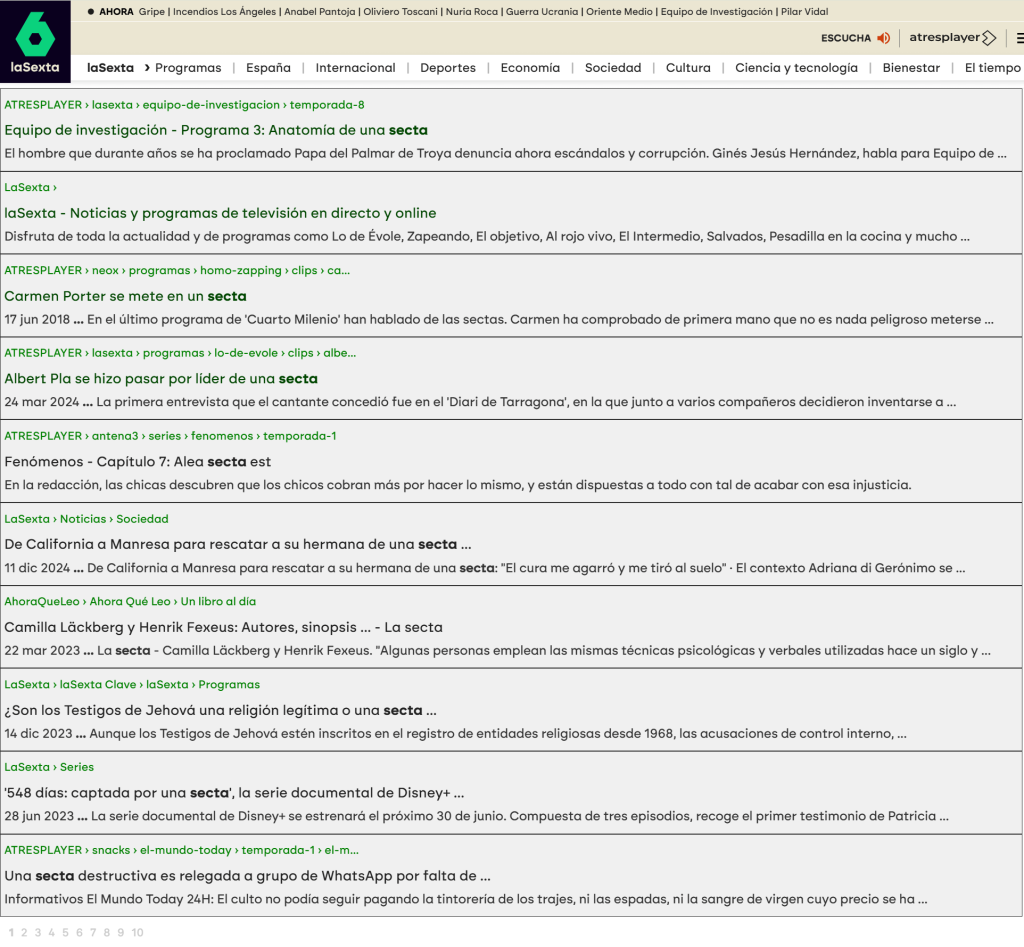
In addition to La Sexta, González collaborated with Público, Gara and Naiz, and was also the director and co-founder of Eulixe, an independent digital outlet.
The ending of Pablo González’s story — his return to Russia as part of a prisoner exchange operation — reveals a key point that answers the question: how can one determine whether someone accused of working for a foreign state is a real spy or the accusations are fabricated to discredit them? González was exchanged and brought to Russia where he was welcomed as a hero. Moreover, while he operated as a pro-liberal opposition figure in European countries, holding the dual Spanish and Russian citizenship, he was never condemned by Russian state-owned propaganda channels, never declared a foreign agent, and his Russian relatives were never subjected to searches, threats, or torture. If he weren’t a real agent, all of this would seem strange, wouldn’t it? Given the increasingly repressive and totalitarian machinery in Russia in recent years.
In this case, we see yet another coincidence: accusations of working for a foreign state are one of the favorite methods used by anticultists to discredit their chosen targets. However, anticultists adapt the accusations to the political context of a given country, regardless of the actual circumstances — whether an accused individual or organization is really guilty or not. It is noteworthy that such accusations from anticult players who reside, for example, in two opposing countries are voiced simultaneously and synchronously, almost as if on command, showing remarkable cohesion despite the absurdity of this kind of situation during the confrontation between their countries.
For instance, a target identified by RACIRS and its leader Alexander Dvorkin in Russia is accused of being a foreign agent working for the US intelligence services. At the same time, American anticultists synchronously voice identical accusations against the same organization or group of people, with the sole difference that they claim the organization or group is working for Russian intelligence agencies and Putin. To illustrate this kind of absurdity that is indeed taking place, we will cite an example from real life.
This method of persecution is actively used by anticultists against the Jewish religious movement Chabad-Lubavitch. In the United States, with the support of Dvorkin’s agents, materials are being published discrediting Chabad-Lubavitch as agents of the Kremlin and personally of Putin, while in Russia, also with Dvorkin’s involvement, representatives of this Jewish religious community are portrayed as agents of the “enemy state” — the USA, who are allegedly controlled from New York City. Isn’t that strange? However, it only highlights the cynicism and deliberate falsehood of anticult activists within a single international network, who claim to be fighting against “cults” and “sects,” but actually engage in destructive anti-democratic activities, destabilize their own countries, and contribute to the rise of Nazism and totalitarianism.
Yet, what kind of rhetoric would be used regarding real agents of a specific country? Most likely, the situation would unfold similarly to that of the GRU agent Pablo González. In Russia, he was welcomed as a hero and a loyal servant of the empire; he was greeted with a firm handshake from Vladimir Putin and embraced by intelligence officers including his GRU colleague Oleg Sotnikov. By the way, Oleg Sotnikov is on the FBI’s most-wanted list for his involvement in various hacking operations targeting organizations such as the Organization for the Prohibition of Chemical Weapons (OPCW), the U.S. Anti-Doping Agency (USADA), and the World Anti-Doping Agency (WADA) 10.
In the whole story of Pablo González, there still remain unresolved questions that may only be answered over time. Some of the questions are as follows: Did the GRU agent have other objectives at Charles University in the Czech Republic? Did he manage to sway anyone to his side or recruit someone? Who else did he interact with, and what consequences may arise for the university itself, its students, and the Czech Republic as a whole? This story is particularly troubling given that Charles University is a stronghold of Czech anticultism.
Example from the Czech Republic. Another coincidence: Charles University as the center of Czech anticultism
One of the most well-known anticultists in the Czech Republic is Zdeněk Vojtíšek who heads the Department for Religious Studies at the Hussite Theological Faculty of Charles University and is also an associate professor at the Protestant Theological Faculty of Charles University. This was covered in the article “Czech Anti-Cult Movement”* earlier published on the portal actfiles.org.
*Additional mentions of representatives of the Czech anticult movement can be found in the articles “Centralized International Anticult Network of Agents Led by Alexander Dvorkin” and “Anti-Cult Orders Established On Children’s Blood”.
Among professors of Charles University, there is another prominent representative of Czech anticultism — Ivan Odilo Štampach who has been teaching theological and religious disciplines since 1996 as part of the study of Christian tradition theology at the Evangelical Theological Faculty of Charles University. In 1993, Ivan Odilo Štampach and Zdeněk Vojtíšek founded the anticult association “Society for the Study of Sects and New Religious Movements” based at the Hussite Theological Faculty. Thanks to these professors and their colleagues, many students of Charles University have taken up the anticult path and adopted Nazi methods of dehumanization, stigmatization of undesirables with the labels “cult” and “sect,” trampling on the foundations of democracy, and undermining the rule of law.
Let’s focus on one such student of Charles University, named Jakub Jahl, and examine the results of his anticult activities under the guidance of RACIRS, as well as his aspirations towards the Czech branch of the Greens — the Pirate Party.
Jakub Jahl
In August 2024, independent journalists from the portal actfiles.org already drew attention to the activities of this Czech anticult player. Of particular concern were Jakub Jahl’s calls for deregistration of the Jehovah’s Witnesses religious movement in the Czech Republic. Such rhetoric understandably raised alarm, given the prolonged brutal persecution of members of this religious group in Russia, instigated by the anticult leader Alexander Dvorkin.
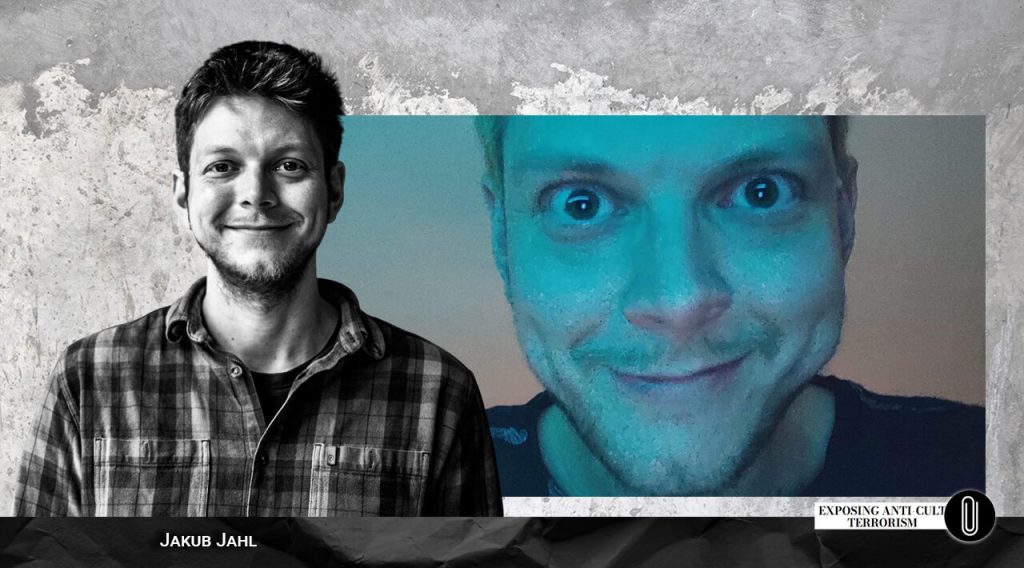
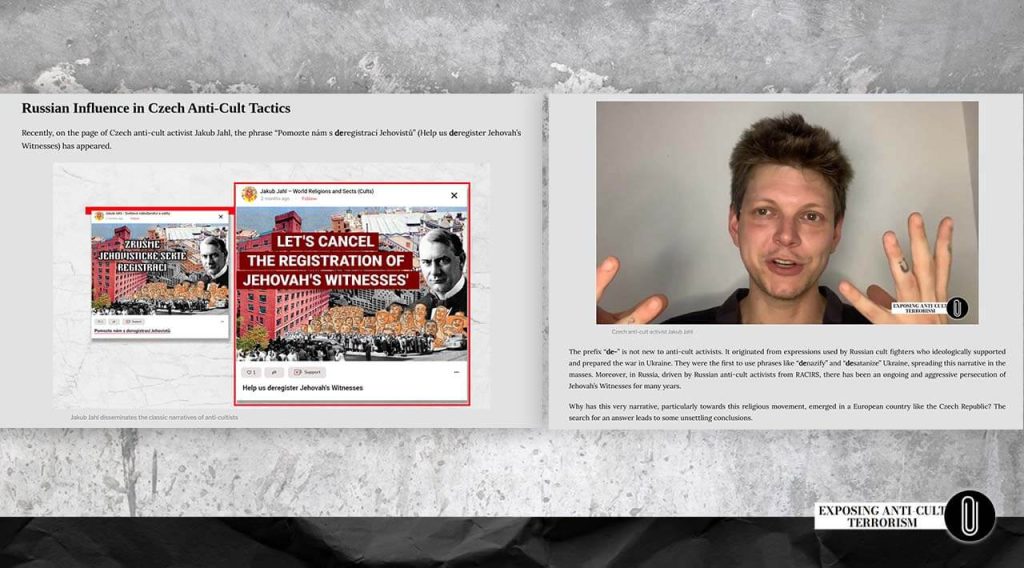
Concerns about the possible control of the Czech religious field by the Russian pro-religious association RACIRS, voiced in the aforementioned article, are, unfortunately, being confirmed. A piece of news currently circulating in the Czech religious information space highlights not only the dangerous situation faced specifically by Jehovah’s Witnesses, but also the alarming state of religious freedom in the Czech Republic in general. This calls into question the preservation of fundamental democratic principles in European countries.
Here’s an excerpt from an article in the authoritative scientific journal on religious freedom and human rights Bitter Winter, titled “Czech Republic in the Footsteps of Russia? Jehovah’s Witnesses Threatened with Liquidation” 11.
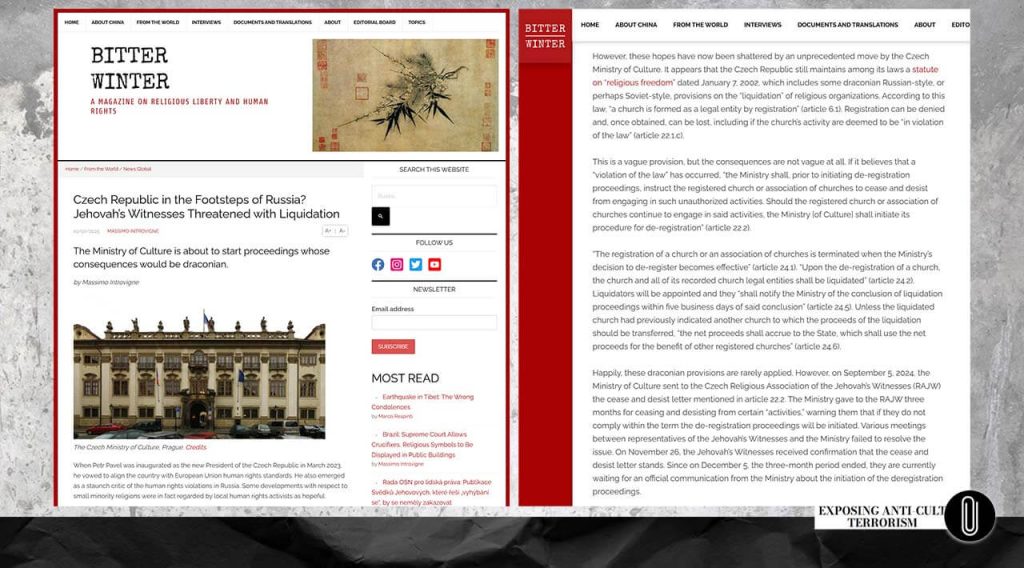
“However, on September 5, 2024, the Ministry of Culture sent to the Czech Religious Association of the Jehovah’s Witnesses (RAJW) the cease and desist letter mentioned in article 22.2. The Ministry gave to the RAJW three months for ceasing and desisting from certain ‘activities,’ warning them that if they do not comply within the term the de-registration proceedings will be initiated. Various meetings between representatives of the Jehovah’s Witnesses and the Ministry failed to resolve the issue. On November 26, the Jehovah’s Witnesses received confirmation that the cease and desist letter stands. Since on December 5, the three-month period ended, they are currently waiting for an official communication from the Ministry about the initiation of the deregistration proceedings.”
“In the Czech Republic, the Jehovah’s Witnesses are offered the alternative of renouncing beliefs that are part of their interpretation of the Bible, thus ‘disobeying God,’ or being deregistered, having their assets liquidated, and being put in the impossibility to operate as a religious organization. That this happens in Russia is unfortunately normal. It is a scandal when it is proposed in a democratic country and a member state of the European Union.”
In December 2024, the three-month deadline given to Jehovah’s Witnesses expired. What will follow? The outcome will depend on whether democracy is still alive in the Czech Republic or RACIRS has completely ruined it. At first glance, the persecution in Russia and the oppression in the Czech Republic may seem incomparable, but everything starts small. If we allow our freedom and rights to be restricted today, tomorrow we will find ourselves in a totalitarian state. Discrimination, human rights violations, and promotion of an ideology of superiority of some people over others — in other words, Nazism — in any form are entirely unacceptable in the civilized world.
According to statements by Jehovah’s Witnesses 12, there are 17,296 of their followers in the Czech Republic. This raises a question: can it be possible in our democratic world for a self-proclaimed expert to be the cause of ruined lives of more than 17,000 innocent citizens of a country through repressions he has provoked against their rights and fundamental freedom of religion? It turns out it can be possible if that person is Dvorkin’s Russian agent.
Notably, Jakub Jahl continues his Nazi anticult propaganda for RACIRS against Jehovah’s Witnesses on his Facebook page and YouTube channel.
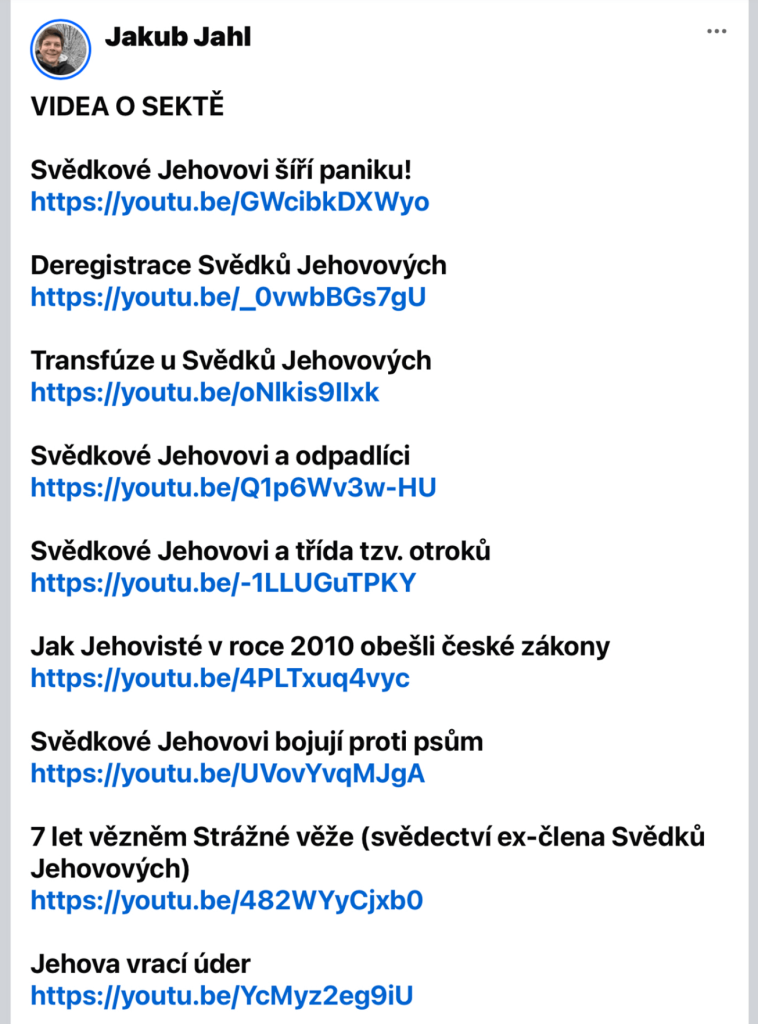
- Jehovah’s Witnesses spread panic!
- Deregistration of Jehovah’s Witnesses
- Blood transfusions among Jehovah’s Witnesses
- Jehovah’s Witnesses and Apostates
- Jehovah’s Witnesses and the so-called slave class
- How Jehovah’s Witnesses circumvented Czech laws in 2010
- Jehovah’s Witnesses fighting against dogs
- 7 years in captivity of the Watchtower (testimony of a former Jehovah’s Witness)
- Jehovists strike back
Jakub Jahl and the Pirate Party of the Greens
Jakub Jahl has been noted for his eagerness to join the Czech Pirate Party (often referred to as the Czech Pirates) that is associated with the Greens. On the forum of this political party, in the section “Interested in Membership. Prague,” he wrote the following 13:
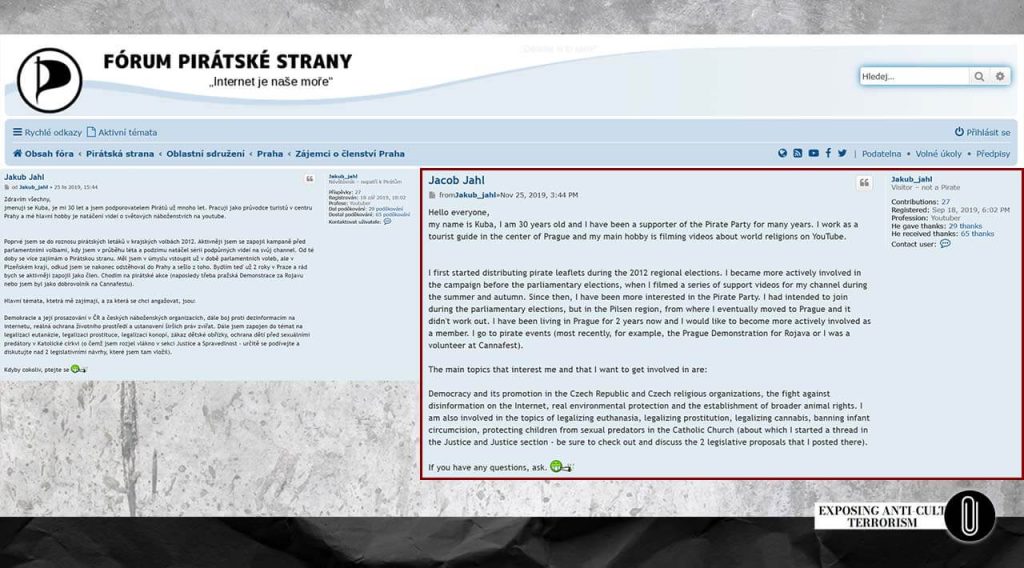
Jakub Jahl:
“Hello everyone,
My name is Kuba, I’m 30 years old, and I’ve been a supporter of the Pirates for many years. I work as a tour guide in the center of Prague, and my main hobby is making videos about world religions on YouTube.
I first got involved in distributing Pirate flyers during the regional elections in 2012. I became more actively involved in the campaign before the parliamentary elections, when I filmed a series of supportive videos for my channel during the summer and autumn. Since then, I’ve been more interested in the Pirate Party. I intended to join during the parliamentary elections, but I moved from the Plzeň region to Prague, and it didn’t happen. I’ve now been living in Prague for 2 years, and I’d like to get more actively involved as a member. I attend Pirate events (most recently, for example, the Prague Demonstration for Rojava, or I volunteered at Cannafest).
The main topics that interest me and for which I want to advocate are:
– Democracy and its promotion in the Czech Republic and Czech religious organizations,
– Fighting disinformation on the internet,
– Real environmental protection and the establishment of broader animal rights.
I’m also involved in topics such as the legalization of euthanasia, legalization of prostitution, legalization of cannabis, banning child circumcision, and protecting children from sexual predators in the Catholic Church (I started a thread about this in the Justice and Fairness section — be sure to check it out and discuss the two legislative proposals I posted there).”
In 2021, Jakub Jahl developed a thread on the party’s forum, proposing a Czech-Tanzanian partnership 14.
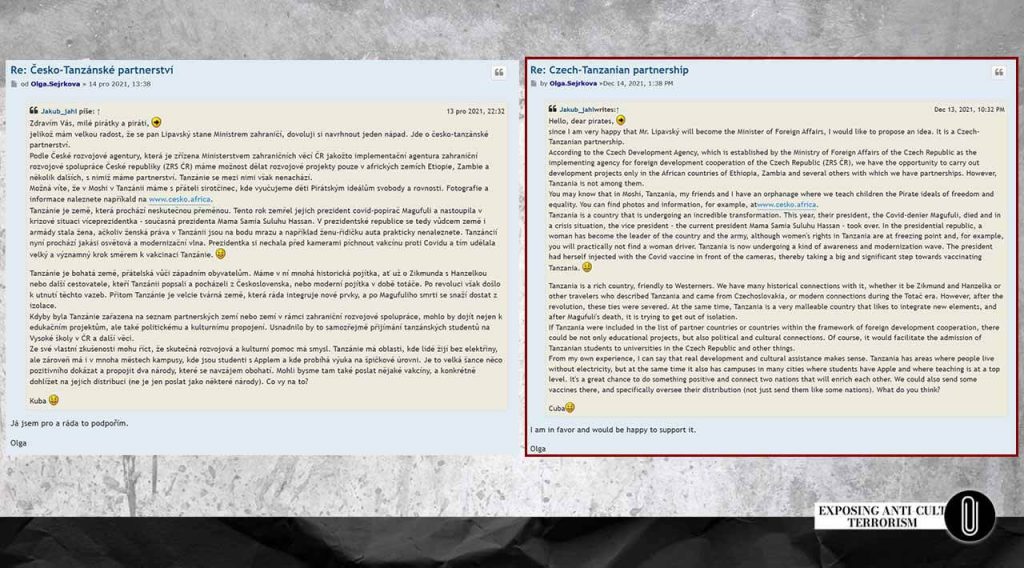
Jakub Jahl also participates in discussions on the forum in threads such as “Sexual Violence in the Catholic Church” and “Ban on Religious Circumcision of Children.” Among other things, he has called on forum participants to meet in person 15.
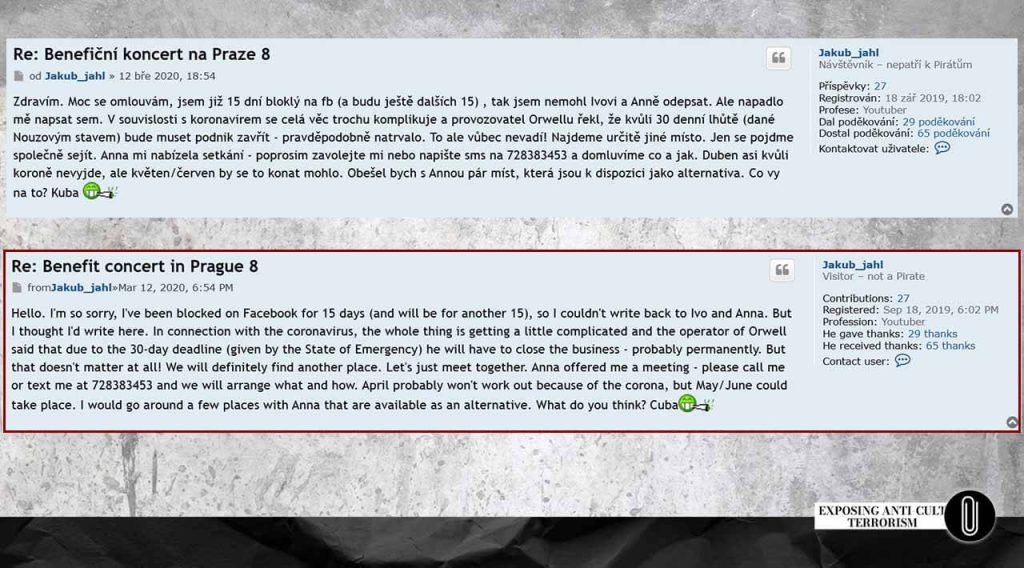
Despite the attempts of the anticult agent Jakub Jahl to infiltrate the Czech branch of the Greens — the Pirate Party — fortunately, thanks to the vigilance of some of its members, he failed. However, he did manage to attend meetings of the party members, take part in conferences, network, and expand his circle of contacts. What exact goals he was pursuing and whose goals those were remains unknown. However, considering the activities of his anticult colleagues from various countries and their systematic attempts to align with their Russian handlers, this raises serious concerns. Notably, the Pirate Party that Jakub Jahl was so eager to join is also present in the neighboring country — Slovakia.

Another Czech anti-cultist, similarly inclined towards the “environmental” agenda and climate change issues, is Alex Alvarova.

Conclusions
In this article, we have examined the presumed reasons and motives of anticult actors from various countries in their pursuit of the green agenda and climate change topics, taking into account their anti-democratic activities that benefit the Russian pro-religious organization RACIRS, as well as their connections with agents of Russian intelligence services (discussed in more detail in Part 1).
We have also explored the example of a Russian intelligence agent who operated for many years in the EU countries within circles opposing the Russian government and promoting liberal and pro-democratic values. This example serves as an important precedent for members of the international community committed to defending democracy and fundamental human rights. It highlights the need to rethink the established perception of foreign agents and their outward activities in light of today’s unstable political realities. In a world where the boundaries between truth and lies are increasingly blurred, vigilance and responsibility are crucial for everyone. We must defend the free and just world where all people will be able to live safely and peacefully, in harmony with the environment and with one another.
Additional methods and means of infiltration by agents of anti-democratic forces and their accomplices into democratic countries will be investigated in future publications on actfiles.org.
Source:
1. https://theins.ru/en/politics/268694
2. http://orthodoxeurope.org/print/19/2/120.aspx
3. https://rus.delfi.lv/57860/latvia/13585949/prezentovan-sayt-russkogo-alyansa
4. https://theins.ru/en/politics/271808
5.http://www.alexandrastein.com/uploads/2/8/0/1/28010027/attachment_networks_and_discourse_in_ext.pdf
6. https://www.antena3.com/noticias/mundo/doble-vida-pablo-gonzalez-periodista-espanol-que-trabajaba-como-espia-kremlin_20241014670d71a6e2e54f000180ba6e.html
7. https://www.antena3.com/noticias/mundo/espia-pablo-gonzalez-documentaba-sus-misiones-informes-personas-lugares-interes-espionaje-ruso_202410166710142d596dfb0001c71549.html
8. https://www.irozhlas.cz/zpravy-domov/agent-pablo-v-praze-rusky-spion-z-nedavne-vymeny-pronikl-mezi-akademiky_2408220500_mst
9. https://www.lasexta.com/buscador-site/index.html?q=secta
10. https://vsquare.org/putin-pablo-gonzalez-russian-gru-illegal-spy-oleg-sotnikov/
11. https://bitterwinter.org/czech-republic-in-the-footsteps-of-russia-jehovahs-witnesses-threatened-with-liquidation/?_gl=1*bgxiz6*_up*MQ..*_ga*OTk4MDM4NzguMTczNjE1MzcwMQ..*_ga_BXXPYMB88D*MTczNjE1MzcwMS4xLjAuMTczNjE1MzcwMS4wLjAuMA
12. https://www.jw.org/cs/svedkove-jehovovi/na-celem-svete/CZ/
13. https://forum.pirati.cz/viewtopic.php?t=49943
14. https://forum.pirati.cz/viewtopic.php?p=786680#p786680
15. https://forum.pirati.cz/viewtopic.php?p=686151#p686151
16. https://www.slovenskipirati.sk/program/

